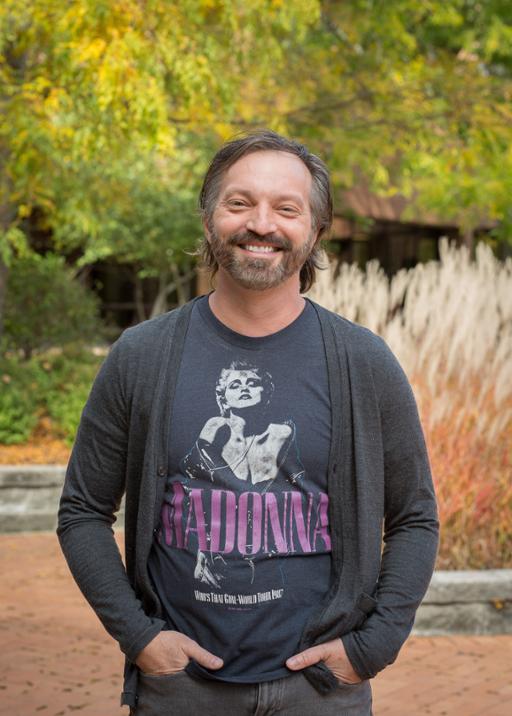A Matter of Perspective
Professor Michael Flatt helps students step outside their own experiences and examine social justice issues from a sociologist’s perspective
 Racism. Prejudice. Privilege.
Racism. Prejudice. Privilege.
Each of these words carries great meaning — though agreeing on that meaning can be difficult.
Take prejudice, for example — one of several concepts that Cuyahoga Community College sociology professor Michael Flatt describes as “massively misunderstood.”
“No one wants to be told that they’re prejudiced,” he said. “But in reality, ‘prejudice’ simply means ‘pre-judgment.’ We all make pre-judgments in our social interactions. The danger comes when we let our pre-judgments affect how we treat others.”
Like many in his field, Flatt believes that thinking like a sociologist can help us step outside ourselves to see things from another’s perspective. Analyzing the assumptions we make about society based upon our own experiences and beliefs can be eye-opening.
“The social groups we belong to shape us in invisible ways,” he said. “For me, helping people make connections between their personal experiences and the public issues of the moment never gets old.”
An Unexpected Career Path
The Akron native wasn’t always so sure what he was meant to do, however.
After moving to Cleveland at 19, Flatt worked in the service industry to pay for college — a class or two at a time. Eventually, after seven years at Cleveland State University without declaring a major, he discovered he had met the requirements for a Bachelor of Arts in sociology.
“I didn’t have an academic plan, and I honestly didn’t even know enough to see an adviser,” he said. “It took me a while to discover that I was a sociologist at heart.”
While pursuing his master’s and doctorate degrees, Flatt taught sociology, bioethics and health sciences classes as an adjunct instructor at Cleveland State, Case Western Reserve University and Tri-C’s Metropolitan and Western campuses.
Aware that securing a full-time teaching position can be challenging, he devised a backup plan: an apprenticeship as a funeral director. “I’ve always been interested in the rituals and social interactions that surround death,” he explained.
In the end, his passion and talent for teaching a wide variety of topics to diverse groups of people led to his 2016 appointment as a full-time professor at Tri-C’s Western Campus.
Taking a Stand
Since then, Flatt has established himself as a go-to resource for knowledge and advice regarding social justice issues. In addition to serving as faculty adviser to the campus’ Lambda Gender-Sexuality Alliance, he works with College administration to ensure LGBTQ+-inclusive policies and practices as president of the employee-led Sexual Orientation and Gender Equality (SOGE) Council.
Flatt is a founding member of Tri-C’s Institute on Poverty and Urban Education, for which he currently serves as research director. He is also on the advisory committee for the College’s newly formed Stand for Racial Justice alliance.
“I’m proud to work at an institution whose employees are invested in the outside world,” he said. “Not until we’re all willing to take a stand will we see meaningful change.”
A New Perspective
Flatt inspires that same drive toward meaningful change in his students. His courses are designed to help them identify the social constraints that unconsciously guide their actions and shape their beliefs — ultimately breaking through those constraints in order to gain a new perspective.
“One of the best things about teaching sociology is that you get to dive into topics like race, gender, sexual orientation, religion and politics,” Flatt said. “My goal is to help students build the critical thinking skills necessary to defend their viewpoints in rational, thoughtful ways.”
Nick Galaida entered Flatt’s classroom a staunch defender of the Cleveland Indians Chief Wahoo logo and left having produced an opinion column, posted on cleveland.com in January 2017, that called for its retirement.
Another former student, Anton Krieger, was inspired to run for North Royalton city council.
“Knowing that one of my classes encouraged someone to take action and helped them see that they’re capable of changing the world around them is about as much success as I could hope for,” Flatt said.
Building Community
Five years ago, Flatt and his partner, Eric, bought a house in Cleveland’s Westown neighborhood. Staying in the city proper was a non-negotiable, as they wanted to join a community that reflects the area’s diversity. It’s the ideal setting for them and their two chihuahuas, Julio and Lucille.
Along with several Tri-C colleagues, Flatt dedicates a portion of his free time to organizations like the Greater Cleveland Food Bank and Ronald McDonald House, helping to ensure that Northeast Ohioans receive access to the services they need. He values the kinship that volunteerism builds between people from different walks of life.
“It reminds us that we have more in common with our neighbors than we might think,” he said.
Listen and Learn
Looking at today’s issues through a sociological lens can help us all make sense of what is happening around us. In particular, listening to people with different lived experiences from our own can open our eyes to inequities we never realized existed.
“Listening to others may sound simple, but doing so with an open mind and a sense of trust is something that forces us to challenge biases we may not even know we have,” Flatt said.
“As a teacher, one of the most rewarding things I can hear is, ‘I never thought of it that way before.’ To me, that’s student success.”
November 19, 2020
Beth Cieslik, 216-987-4538 beth.cieslik@tri-c.edu
